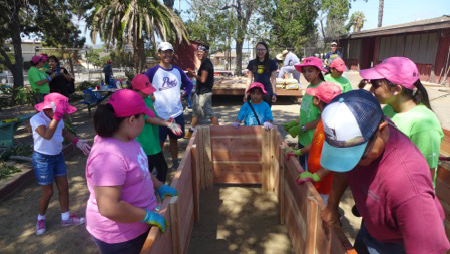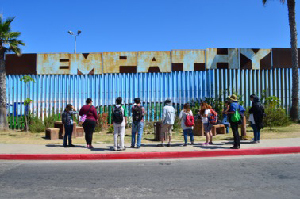
UC San Diego Receives $1M Grant from Mellon Foundation to Expand Cross-Border Work
Community Stations are developing a new partnership for urban intervention
Published Date
By:
- Grace Sevilla
Share This:
Article Content

UC San Diego students in the 2016 Summer Field Internship working with San Ysidro residents in the community garden at Casa Familiar.
In an era of wall-building, they are breaking boundaries and engineering bridges.
UC San Diego professors Fonna Forman and Teddy Cruz are creating links between the university and marginalized communities straddling the U.S.-Mexico border. Where some see chaos and crisis, Cruz and Forman see the future. The border region they say, is an ideal site for tackling urban inequality.
“At a time when the border is increasingly being presented as a site of threat, violence and criminal activity, we see it as a laboratory for environmental, social and artistic creativity,” said Cruz, a celebrated architect and visual arts professor.
Now, a grant of $1 million from The Andrew W. Mellon Foundation will help advance the university-community partnership. Over the next four years, the funding will expand the Cross-Border Community Stations project spearheaded by Cruz and Forman.
“As part of our commitment to the public arts and humanities, we value programs that take seriously the knowledge that lives in communities and helps bring that research into university curricula,” stated Mariët Westermann, executive vice president of The Andrew W. Mellon Foundation.
Along the international seam, two field-based research hubs are being developed in collaboration with community-based agencies—one with Casa Familiar in San Ysidro, the southernmost community in San Diego, the other in Tijuana with a nascent coalition of grass-roots organizations.
Here, UC San Diego is taking a new approach to social justice, engaging the community in identifying their most urgent issues and working with local leaders to devise intervention projects to address poverty, educational and environmental needs.
“Our work in the community is not about “charity.” This is not about the university dropping in and testing or applying what it knows to a community. We are doing neither of these two things. We are doing research in collaboration with communities,” said Forman, Director of the UC San Diego Center on Global Justice.
Respected community leaders are invited to campus to work with university researchers to design a hands-on program. The problem-solving projects become the focus of an eight-week Summer Field Internship that takes undergraduate and graduate students to the border stations where they team up with community residents.

UC San Diego students in the 2015 Summer Field Internship at the Jardin Binacional de Plantas Nativas that is cultivated on both sides of the border fence at Friendship Park. Photos by Fonna Forman and Teddy Cruz
“By working with our neighbors to address mutual concerns and interests, we are strengthening partnerships to improve the quality of life in the region,” said UC San Diego Chancellor Pradeep K. Khosla. “The generous support from the Mellon Foundation for the important work of the Cross-Border Community Stations furthers UC San Diego’s efforts to transcend borders.”
The work began in 2013 with seed funding from University of California Regent Richard C. Blum. Now, the Mellon grant will allow Forman and Cruz to amplify and solidify the work.
Their plans call for engaging community leaders and residents with faculty and students in a year-round program that increases collaboration in research, teaching and service to further “blur the boundaries between the university and the border communities.” The proximity of campus to the border offers a special opportunity to bring real-world experience into the undergraduate curriculum.
In the border neighborhoods of San Ysidro and Tijuana, a scarcity of good jobs, affordable housing, adequately funded schools, clean air and water are some of the urban ills that come into focus.
“Our students can be doing fieldwork in the morning in Tijuana, in some of the poorest slums in Latin America, and be back that same afternoon on campus in San Diego,” said Cruz. “This model links theory and practice temporally and spatially, and amplifies the power of experiential learning.”
The ambitious program is building new partnerships on many levels – creating an exchange of knowledge between the university and the neighborhoods; linking scholars from disciplines that don’t often collaborate such as social science and visual arts; merging civic engagement with research and creativity.
“There are great lessons to be learned from local, bottom-up social and economic practices,” said Cruz. “The Cross-Border Community Stations are creating corridors of knowledge exchange by merging the specialized knowledge from the university together with the practical experience of people living in the border communities. In this way, we are co-producing new knowledge.”
Through the Cross-Border Community Stations, UC San Diego is serving as a catalyst to bring together non-profits, students, researchers, civic and neighborhood leaders to confront need and inequality.
“The future of San Diego depends on the future of Tijuana – on shared solutions to climate change, social and economic equity,” said Forman. “The Cross-Border Stations initiative seeks to build new forms of collaboration between two divided cities. We think the university can be that bridge.”
Share This:
You May Also Like
Stay in the Know
Keep up with all the latest from UC San Diego. Subscribe to the newsletter today.


